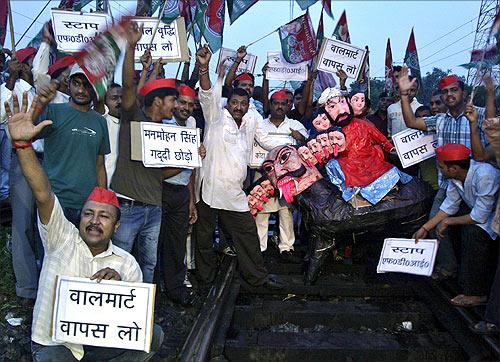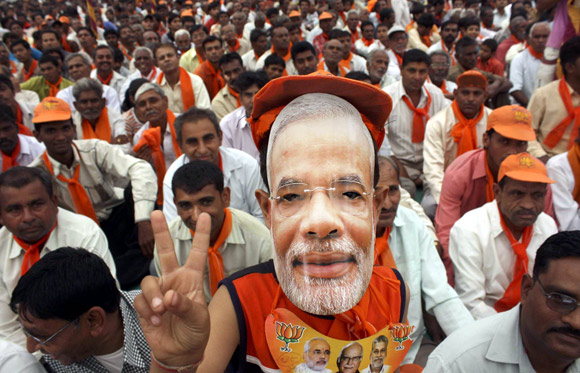Photographs: Jitendra Prakash/Reuters
The country's mood at the end of 2012 is markedly different from that at the end of 2011. Bread and butter issues, not corruption, have become the focus of attention, says T N Ninan
Slowly, subtly, but very definitely, the mood of the country has changed. Having gorged on a surfeit of scandal for the past two years, most people seem to be ready to move on.
Arvind Kejriwal no longer hits the headlines, and Anna Hazare is back in Ralegan Siddhi. The corruption campaigners are chewing the cud, so to speak, even when there are no systemic changes in place, certainly no law to set up a Lok Pal -- which was the big issue before Parliament a year ago.
Nor has operational autonomy been given to the Central Bureau of Investigation. It could be that there has been one scandal too many -- Robert Vadra, Nitin Gadkari and Ajit Pawar coming on top of the coal scandal, the broader mining scandal, the building scandal in Mumbai, the telecom spectrum scandal, and the Commonwealth Games scandals.
How much outrage can the system muster, especially if those in the dock decide to brazen it out and the investigative agencies are willing to play along, when the cases against Mayawati are like little more than tools for arm-twisting a vote?
Since life must go on, better to get on with new spectrum auctions, and not attempt the superhuman task of summoning fresh anger over the possible whitewashing of Maharashtra's irrigation scams. The country seems to be saying that it is willing to live with scams, provided life improves in other ways.
That brings up the second change of mood, with regard to the economy. The sense of despair over tumbling growth rates, double-digit inflation, record trade deficits and plunging exports, not to mention a famine of fresh investment -- all that is now tempered by the hope (more than any hard new facts) that the bottom may have been trawled and things will now get better.
P Chidambaram, back in his familiar perch as finance minister, has contributed to the expectation that there will be better management of the economy, and a greater sense of purpose when addressing the to-do list.
Never underestimate the importance of the stock market in signaling the change of mood. Till midway through 2012, the market had languished and been one of the notable under-performers of the year. Then, as if in anticipation of more substantial changes to come, stock prices climbed rapidly.
The main market indices show a gain of about 25 per cent in short order, and the pundits (most of whom did not predict the surge) now confidently predict a sustained stock price boom in 2013. Much of the difference has come about because the rest of the world has more confidence in India than Indians themselves -- foreign institutional investors poured massive sums into the market, even as retail Indian investors pulled out their money.
...
There is a definite change of mood in India
Image: A supermarket in an Indian metro. Photograph used only for representation purposesPhotographs: Reuters
There is a subtler change of expectations that is also important. Through the five years since the western financial crisis erupted (in March 2008, with the collapse of Bear Stearns), the general Indian assumption had been that while growth had suffered a dip, it would soon revert to the norm, which was seen as the 9.5 per cent annual growth that had been achieved in the boom years of 2005-08.
Indeed, the 'approach' paper for the 12th Five-Year Plan for 2012-17 had put the growth target at 9.0-9.5 per cent. At one stage the prime minister talked of even 10 per cent. Now, when the Planning Commission lowers the optimistic scenario to 8 per cent, there is criticism that it is being unrealistic. In other words, there is no longer the assumption of a 'reversion to mean'.
If the economy achieves 7 per cent average growth rate (the threshold beyond which a country earns the sobriquet of being a 'tiger economy' or 'miracle economy') in these five years, most people will be more than happy. The new mood now is more realistic than what prevailed during the go-go climate of 2005-08, a climate that created the problems of excessive corporate borrowing, excessive government spending and complacence on the macro-economic front.
The new mood recognises that there is work to be done, and that rapid economic growth is not a god-given gift but something that has to be worked for.
It helps that Parliament is seen to be functioning again. In the winter session that concluded a week ago, some legislative business did get done, unlike the previous session which was a wash-out. It was also unlike the winter session of 2011, which ended in a fiasco over the Lok Pal Bill.
Not all of what some new laws and Bills awaiting consideration contain is to be welcomed (the move for mandatory spending by companies on their social responsibility is certainly retrograde, and the new law on land acquisition might well prove counter-productive), but the general relief is that laws are being enacted at all.
TV debates are no substitute for the real thing, as the substantive debate in Parliament on allowing foreign investment in retail showed.
But the perceived change that is perhaps the most important is within the ruling alliance, indeed within its lead party -- the sense that the Congress is no longer a divided house, with the party president pushing for more spending programmes and the prime minister sulking in his tent because he cannot make progress on the economic reforms that he sees as the priority.
The plunging growth rates and the absence of fiscal surpluses that can be spent on welfare measures have combined to help concentrate minds. Suddenly, the realisation seems to have dawned that fiscal correction is necessary and that it is economic reforms that generate the rapid growth that in turn provides the resources with which to take care of the 'aam aadmi' (ie the common man).
This is more the Manmohan Singh line than the Sonia Gandhi one, and the person who seems to have brought about the fresh alignment of thinking seems to be the new-old finance minister. From the country's perspective, who gets the credit is less important than the fact that a new environment has created the base for purposive government action on the economy.
...
There is a definite change of mood in India
Image: A supporter wears the mask of Narendra Modi during a rallyPhotographs: Amit Dave/Reuters
Oddly enough, it is not certain that there is any sweeping change of political mood, of the kind that seemed inevitable a year ago. For all its sins of mis-governance and non-governance, the voters in Himachal Pradesh were willing to vote the Congress back in, as they were earlier in Uttarakhand.
In Gujarat, the number of seats won by the Bharatiya Janata Party has been in the same ball-park range in all the five assembly elections since 1996, while the number of seats won by the Congress has improved marginally.
The gap between the two main parties when it comes to share of popular vote has also remained virtually unchanged since 1996. In other words, Narendra Modi has made very little difference either way, despite all the hype about both him and about Gujarat's economic performance (other states have done better).
If these facts discount the popular theorising about a Modi wave, it still goes without saying that an alienated middle class outside Gujarat could turn to Modi as the man who will provide them with the leadership and corruption-free governance that he is perceived to have given Gujarat, and which are felt to be sorely lacking in New Delhi.
Meanwhile, the action that the government has taken so far in New Delhi has only touched the tip of the iceberg, and in any case is already a mixture of good and bad. Nor is it that the most urgent steps have been taken first.
The Mining Bill still waits to be passed in law, and from the viewpoint of reviving investment was certainly more important than the issue of allowing foreign investment in retailing. The year-long effort to salvage power projects that were to use imported coal has gone nowhere so far, as a result of which some southern states continue to reel from the effects of enormous power cuts.
The build-up of the country's defence capability is another urgent task as China outspends India nearly 3:1 on defence expenditure; unfortunately, the fiscal squeeze is being applied uniformly to spending on hardware acquisitions for the forces. The Sukhoi and MI-17 helicopter deals that were signed when Vladimir Putin came visiting will be the last this financial year; the medium, multi-role, combat aircraft will have to wait for the next financial year.
Sometimes, overtly political objectives have influenced decisions that should have been guided by operational considerations. This explains the sudden announcement, in late November, that 34 cash payment schemes (scholarships, old-wage pensions and the like) in 51 districts will use the Aadhaar unique identity system.
That the announcement was being rushed through with a political calendar in mind became clear when a new slogan was launched (linking Aadhaar to the Congress election symbol of the hand) and the target date of January 1 was made flexible, while the number of districts was reduced to 43.
With the required infrastructure (bank branches, mini-ATMs, banking correspondents) yet to be put into place, the whole thing looked very much like work in progress. The risk now is that premature implementation could boomerang on the Aadhaar project, and do more harm than good.
Nevertheless, change is afoot and so more is expected. At the end of 2012, the issue uppermost in people's minds is no longer policy paralysis, nor is it in-your-face corruption.
What people want are price control, lower interest rates, reform of the tax system, fewer government hurdles in the way of investment...bread and butter issues of the kind that any run-of-the-mill government should be able to deal with. Reverting to miracle growth rates, it would seem, doesn't need miracle steps, nor miracle workers. A modicum of focused governance will do.





article